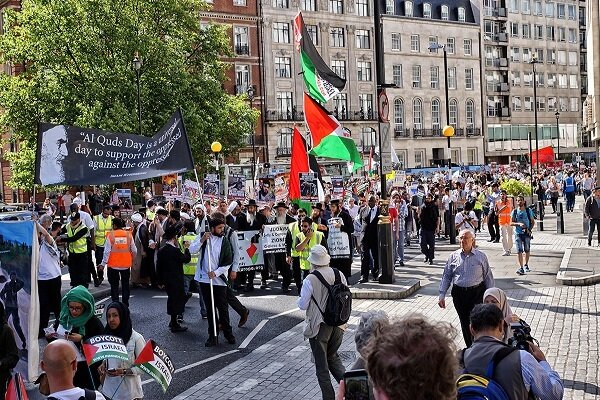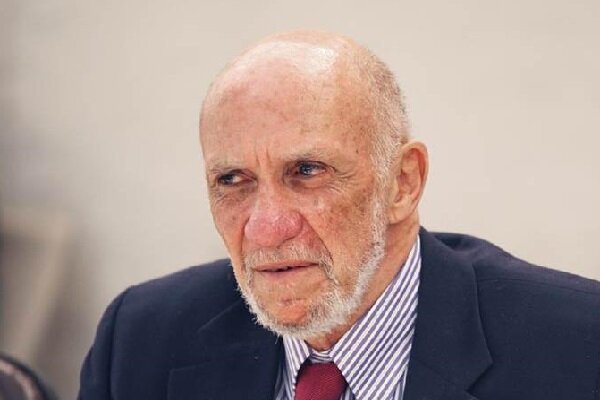Every year, millions of Muslims mark International Quds to underscore the plight of Palestinians as a manifestation of the Palestinian cause, heeding a call by the late founder of the Islamic Republic, Imam Khomeini (RA), who designated the last Friday of every Ramadan as the International Quds Day.
Quds Day is a unique form of a wide-aware campaign against the Israeli occupation of Palestine.
The auspicious day is not merely meant for the declaration of support for an oppressed nation who have been driven out of their motherland and homes but has become the symbol of fighting Arrogance and global hegemons.
The day is not limited to Muslims, as all freedom-seekers of the world join the rallies every year. Iranian religious minorities, including Jews and Christians, also join the demonstrations to live up to Imam Khomeini’s true purpose on declaring the Quds Day and show unity and solidarity with their oppressed brothers and sisters in Palestine.

To shed light on the issue, we reached out to the American professor emeritus of international law at Princeton University Richard Anderson Falk with the following questions:
Have international organizations been successful in addressing the human rights situation in Palestine? If so, why are Israel's human rights abuses still continuing?
International organizations, particularly the United Nations, has a mixed record when it comes to dealing with human rights violations in PalestineInternational organizations, particularly the United Nations, has a mixed record when it comes to dealing with human rights violations in Palestine. The UN, especially the Human Rights Council, has a generally good record in identifying violations and recommending remedies. Such delimitations of Israeli behavior are important in validating Palestinian grievances and justifying international solidarity efforts. Unfortunately, this symbolic verification of wrongdoing with respect to human rights is not substantively implemented. All efforts to enforce human rights are blocked by geopolitics, and particularly the United States. This interference takes various forms, including shielding Israel from accountability by the use of the veto power entrusted to the five Permanent Members of the Security Council.
In addition, Israel has defied the findings and recommendations of international organizations that have found it responsible for serious violations of international human rights standards and the norms of international humanitarian law without suffering from adverse consequences. Israel defends itself not by substantive claims that it has been falsely accused, but by contending falsely that its critics are guilty of antisemitism.
Why are most UN Security Council resolutions against the Israeli regime vetoed by the United States?
The United States has interpreted its ‘special relationship’ as obliging it to shield Israel from criticism at the UN and to block the implementation of any moves to hold Israel accountable. Partly the US Government takes such a position because of its strategic interests in the region and partly as a reflection of well-organized pro-Israeli lobbying, which has been very effective with the US Congress. The UK and France, and the EU generally, have also supported Israel at the international level, although not as strong as the US.
Which governments do you think play the biggest role in violating Palestinian rights?
It is generally believed in West that Iran seeks destruction of Jewish state, and this partly accounts for strong backing of Israel as last European colonial ventureIt seems obvious that the US and the EU countries are most responsible. This reflects in part the broader conflict patterns in the Middle East, which focus on Iran. It is generally believed in the West that Iran seeks the destruction of the Jewish state, and this partly accounts for the strong backing of Israel as the last European colonial venture. It is my understanding that Iran opposes the Zionist Project so far as it seeks to extend Jewish supremacy over the non-Jewish residents of Israel and the Occupied Palestinian Territories. This supremacy has been recently determined to be an instance of the international crime of apartheid by the influential and politically independent human rights organization, Human Rights Watch, as well as by the leading human rights NGO in Israel, B’Tselem.
What is the mission of world public opinion, especially Europe and the United States, in dealing with such inhuman behavior?
There is an encouraging increase in solidarity support in Europe and the US for the Palestinian struggle to achieve basic rights. The BDS campaign is exerting pressure from without and below upon Israel in a manner similar to the anti-apartheid campaign waged successfully against South Africa more than 25 years ago. Israel is losing the Legitimacy War to the Palestinian movement, and the history of anti-colonial movements has demonstrated that what happens with respect to the control of the legitimacy discourse is generally more important over time than what happens on the battlefield in terms of the ultimate political outcome of political struggles in the period since World War II.
How do you assess the internal situation in Israel, given the growing economic pressures and identity challenges in this society
I think the electoral impasse in Israel is a clear indication that all is not well. Israel has drifted politically steadily to the right as to the pursuit of a diplomatic solution of the conflict with Palestine and feels no current security pressure to scale back the ambitions of the Zionist movement. At the same time, there are internal identity challenges evident in the tensions between the secular character of the Israeli state and the increasing leverage of extreme Orthodox Judaism. Whether the economic effects of the boycott and divestment efforts supporting Palestinian goals are being offset by the normalization agreements concluded with Arab governments at the end of 2020 remains to be seen.
Why have peace projects in the region, which are more in the interests of Israel, failed to move forward?
Israel has always felt that its regional security depends on opposing consolidation of any strong regional actor that is sympathetic with Palestinian struggle, such as Iran, Turkey, and SyriaIsrael relies on alleged security threats from Iran to keep its citizens mobilized and unified around this central challenge, although it is Israel that commits aggression against Iran and tries its best to prevent the revitalization of the JCPOA Nuclear Agreement, which will have the effect of eliminating US sanctions on Iran. There has been a shift in Israeli foreign policy priorities from the Palestinian/Arab threat, which has been neutralized at present, to the primacy of the Iranian threat. Iran is seen as threatening Israel’s nuclear weapons regional monopoly and as supporting groups throughout the region that are perceived as hostile to Israel’s interests, including Hamas, Hezbollah, and the Houthis. Israel is aware that the regional balance could shift quickly against it by future political developments, as well as by the deployment and development of weaponry that could challenge its security at home and throughout the region. So long as the Islamic Republic of Iran exists, Israel will base its foreign policy on aggressive military actions toward Iran. Israel has always felt that its regional security depends on opposing the consolidation of any strong regional actor that is sympathetic with the Palestinian struggle, such as Iran, Turkey, and Syria.
Richard Anderson Falk is the author or coauthor of 20 books and the editor or co-editor of another 20 volumes. In 2008, the United Nations Human Rights Council (UNHRC) appointed Falk to a six-year term as a United Nations Special Rapporteur on "the situation of human rights in the Palestinian territories occupied since 1967."
Interview by Zahra Mirzafarjouyan


























Your Comment